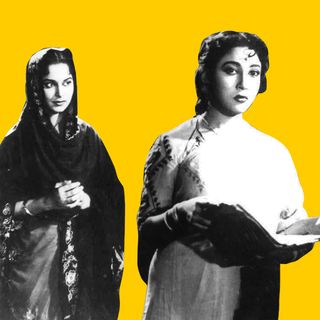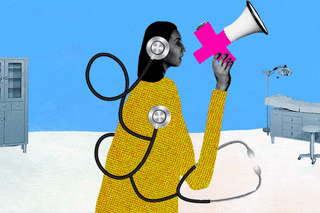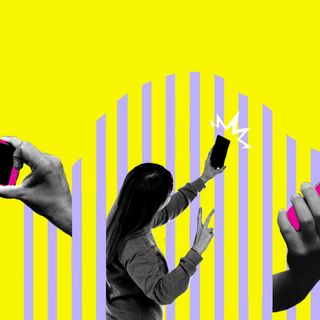
Medical Gaslighting Impacts Women’s Health — But Self‑Advocacy Isn’t Always the Solution It’s Touted to Be
Gender bias in medical research created a deficit of data pertaining to women’s health – denying women the information they need to advocate for themselves.

“I get to have a voice in front of my doctor because I go fully prepared with all of my points, backed by research papers,” says Anindita Kundu, a mental health professional diagnosed with endometriosis. Prior to their diagnosis, they were told their pain was psychosomatic. Even when they brought up the possibility of having the condition to their gynecologist, they were dismissed, and accused of exaggerating in their quest for a diagnosis. “Medical gaslighting is trauma. And for so many of us, it’s not a one-off event, but a recurring experience… [F]inding a medical professional who actually listens, has empathy and compassion, believes the pain that women come with, and perceives patients as equal stakeholders in their diagnoses is like finding a needle in a haystack.” For many women, self-advocacy helps combat this.
Research shows that women are seven times more likely than men to not only be misdiagnosed but also discharged — while in the middle of a heart attack. Society routinely underestimates women’s medical struggles, breeding a bias that translates into clinicians treating female patients with apathy and putting their lives at risk. But in the digital era, the internet and its endless resources has allowed Kundu — among others — to advocate for themselves in a bid to combat medical gaslighting. They don’t think they would’ve managed to be taken seriously by medical professionals had they not armed themselves with information.
Self-advocacy — which argues for effective communication, negotiation, or assertion of one’s interests, needs, and rights — evolved as part of the disability rights movement in the latter half of the twentieth century. Now, for individuals living with chronic illnesses and disabilities — especially women with invisible symptoms — self-advocacy has emerged as the most significant tool to access the care and resources they need, by enabling them to combat bias with information.
Unfortunately, self-advocacy comes with its own set of challenges — especially for women. Gender bias in medical research has created a deficit of data pertaining to women’s health — denying women the information they need to advocate for themselves. Further, many medical professionals perceive pain as merely a “symptom of being female.” They also believe that women are overly emotional creatures, who exaggerate their “routine” discomfort of experiencing menstrual cramps, and refuse to investigate whether there might be a reason — like endometriosis, PCOS, and thyroid, among others — that is causing them to suffer. As a result, Kundu struggled with medical gaslighting after their diagnosis, too. “I once had an orthopedic doctor laugh at me when I asked about my sciatic pain being related to my endometriosis… My endometriosis specialist found out later that I had a massive nodule on my uterosacral ligament, due to which I had sciatic pain.”
Related on The Swaddle:
Not Every Autistic Person is a ‘Savant.’ But the Stereotype Has Significant Mental Health Costs.
Moreover, the act of self-advocating itself involves resisting the social conditioning women undergo. The fact that women are trained to be people-pleasers from a very young age further complicates the gendered struggle of speaking up for oneself. “[M]en have a tendency to be more vocal and more persistent with their concerns. Women may have a harder time pushing back and advocating for themselves. They feel like they need to be good patients, which means accepting what their doctors tell them,” says Bella Grossman, a clinical psychologist.
In addition, being shamed for every choice that questions people in positions of power distorts women’s sense of self-worth, causing their self-confidence to take a beating. And debating — or even just negotiating — with a medical professional requires one to overcome the obvious power inequality between a doctor and a patient. “There is an inherent power hierarchy within the four walls of the clinic of a doctor, a mental health professional, a psychiatrist, and all allied healthcare professionals. The patient coming in is already vulnerable and is already going through a lot. It is the job of the professional, there, to question this power that we, as healthcare professionals, hold, and share it with the client so that they can feel safe in that space,” says Kundu.
One fix, according to Tina Sacks,an associate professor in the school of social welfare at UC Berkeley, is to negotiate with oneself, too — using self-assurance as a tactic to topple this power dynamic. “One thing to remember when we go to the doctor is that the provider has specialized knowledge of healthcare and health topics in general, but you know your body. You do know more than anyone else what is happening to yourself,” Sacks told CNBC, urging female patients to persist with questioning their doctors than falling into the trap of questioning their own experience as a result of being gaslit.
Moreover, self-advocacy requires one to effectively communicate their ordeals — especially so they can successfully counter convoluted medical jargon with their lived experiences. But the lack of awareness about the manifestation of different disorders in women — in research as well as in common parlance — means that we often lack the vocabulary to accurately capture our experiences. To make matters worse, symptoms of certain conditions — like autism, and conditions that can induce brain fog, for instance — that women are often denied diagnoses for, entail communication deficits, further jeopardizing one’s prospects in the doctor’s clinic.
Related on The Swaddle:
‘Masking’ for Years Can Leave Autistic People Confused About Who They Really Are
“[I]n hindsight, the brain fog I was experiencing made it even more difficult to see things as clearly as I do now… [A]ll the doctors [had] told me it was probably a result of depression since my boyfriend had moved away. They told me it’s all in my head — but while I knew I was sad about my boyfriend moving, I knew I wasn’t depressed. If anything, I was depressed because I wasn’t getting any help,” a woman had told The Swaddle anonymously in 2021. Her chance discovery led her to the medical expert quoted in the article, who was also a national expert on Postural Orthostatic Tachycardia Syndrome (commonly known as POTS), and eventually, diagnosed her.
But even if one is able to go up against the double whammy of social conditioning and power hierarchy, the fact remains that despite being an effective tool, self-advocacy doesn’t guarantee success against medical gatekeeping. After being dismissed by multiple medical professionals, Rakshitha, who is now in her mid-30s, decided to self-diagnose herself with autism. While self-diagnosis is looked down upon by multiple medical professionals, sometimes it’s the only recourse available to people against systemic biases and the financial burden of consulting a large number of professionals. Rakshitha finally received a formal diagnosis in 2020 after being rejected by 10 professionals. If it wasn’t for the internet, and her refusal to give up, Rakshitha would’ve never understood an integral part of their psyche.
Self-advocacy isn’t a solution to systemic bias, though; it is merely a tool to combat it. Unfortunately, however, not everyone can afford to be a self-advocate, with access to the internet itself being a privilege. Putting the country’s glaring digital gender divide in perspective, reports suggest that only one in three Indian women have ever used the internet, compared to almost 60% of Indian men. What makes matters worse, to an extent, is the fact that women’s literacy rate in India is a dismal 77%, according to a recent report — indicating that even if the remaining 23% were able to access the internet, they probably wouldn’t know how to use it to their advantage.
As Kundu says, “I hate that the burden of research and advocacy falls on us, who are already struggling with the debilitating aftermath of this diagnosis… I hope, someday, there is more willingness among healthcare professionals to share their power, trust our diagnoses, and run tests believing that the pain that we experience is real and not in our heads.”
Devrupa Rakshit is an Associate Editor at The Swaddle. She is a lawyer by education, a poet by accident, a painter by shaukh, and autistic by birth. You can find her on Instagram @devruparakshit.
Related


The ‘Dark Triad Theory,’ Debunked
